第四章 分句、合句法
- 格式:doc
- 大小:56.00 KB
- 文档页数:4
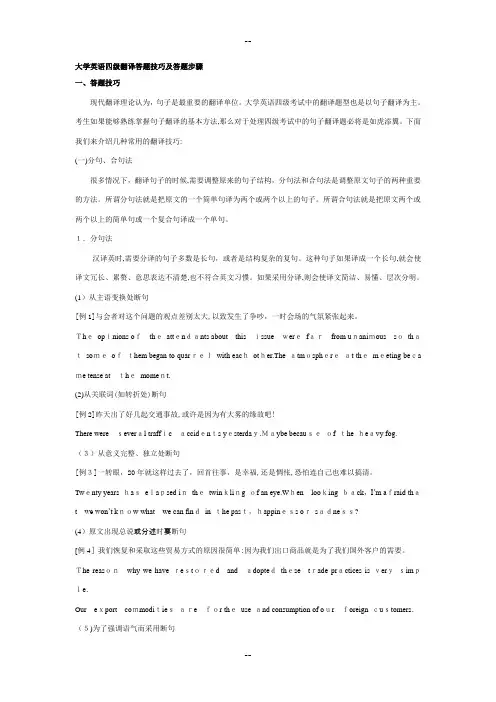
大学英语四级翻译答题技巧及答题步骤一、答题技巧现代翻译理论认为,句子是最重要的翻译单位。
大学英语四级考试中的翻译题型也是以句子翻译为主。
考生如果能够熟练掌握句子翻译的基本方法,那么对于处理四级考试中的句子翻译题必将是如虎添翼。
下面我们来介绍几种常用的翻译技巧:(一)分句、合句法很多情况下,翻译句子的时候,需要调整原来的句子结构,分句法和合句法是调整原文句子的两种重要的方法。
所谓分句法就是把原文的一个简单句译为两个或两个以上的句子。
所谓合句法就是把原文两个或两个以上的简单句或一个复合句译成一个单句。
1.分句法汉译英时,需要分译的句子多数是长句,或者是结构复杂的复句。
这种句子如果译成一个长句,就会使译文冗长、累赘、意思表达不清楚,也不符合英文习惯。
如果采用分译,则会使译文简洁、易懂、层次分明。
(1)从主语变换处断句[例1]与会者对这个问题的观点差别太大,以致发生了争吵,一时会场的气氛紧张起来。
Theopinions oftheattendants about thisissuewerefarfrom unanimous sothatsomeofthem began to quarrelwith eachother.The atmosphereat themeeting beca me tense atthemoment.(2)从关联词(如转折处)断句[例2]昨天出了好几起交通事故,或许是因为有大雾的缘故吧!There wereseveral trafficaccidents yesterday.Maybe becauseof the heavy fog.(3)从意义完整、独立处断句[例3]一转眼,20年就这样过去了,回首往事,是幸福,还是惆怅,恐怕连自己也难以搞清。
Twenty years haselapsed inthetwinkling of an eye.When looking back,I’m afraid that we won’t know what we can findin the past,happiness orsadness?(4)原文出现总说或分述时要断句[例4]我们恢复和采取这些贸易方式的原因很简单:因为我们出口商品就是为了我们国外客户的需要。
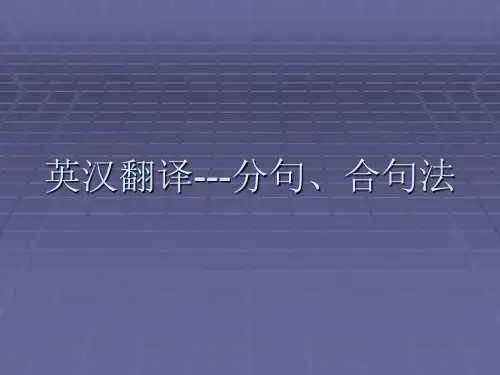
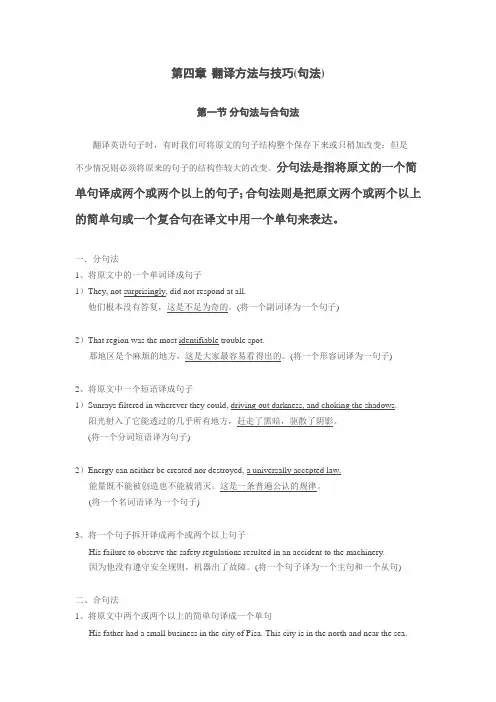
第四章翻译方法与技巧(句法)第一节分句法与合句法翻译英语句子时,有时我们可将原文的句子结构整个保存下来或只稍加改变;但是不少情况则必须将原来的句子的结构作较大的改变。
分句法是指将原文的一个简单句译成两个或两个以上的句子;合句法则是把原文两个或两个以上的简单句或一个复合句在译文中用一个单句来表达。
一.分句法1、将原文中的一个单词译成句子1)They, not surprisingly, did not respond at all.他们根本没有答复,这是不足为奇的。
(将一个副词译为一个句子)2)That region was the most identifiable trouble spot.那地区是个麻烦的地方,这是大家最容易看得出的。
(将一个形容词译为一句子)2、将原文中一个短语译成句子1)Sunrays filtered in wherever they could, driving out darkness, and choking the shadows.阳光射入了它能透过的几乎所有地方,赶走了黑暗,驱散了阴影。
(将一个分词短语译为句子)能量既不能被创造也不能被消灭。
这是一条普遍公认的规律。
(将一个名词语译为一个句子)3、将一个句子拆开译成两个或两个以上句子His failure to observe the safety regulations resulted in an accident to the machinery.因为他没有遵守安全规则,机器出了故障。
(将一个句子译为一个主句和一个从句)二、合句法1、将原文中两个或两个以上的简单句译成一个单句His father had a small business in the city of Pisa. This city is in the north and near the sea.他的父亲在意大利北部近海的比萨做小生意。
(将两个单句译为一个单句)2、将原文中的主从复合句译成一个单句When I negotiate, I get nervous. When I get nervous, I eat.我在谈判时总是有些紧张。


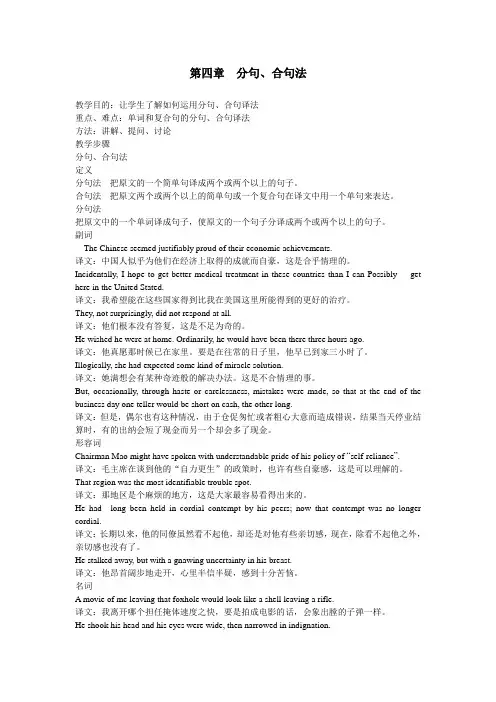
第四章分句、合句法教学目的:让学生了解如何运用分句、合句译法重点、难点:单词和复合句的分句、合句译法方法:讲解、提问、讨论教学步骤分句、合句法定义分句法---把原文的一个简单句译成两个或两个以上的句子。
合句法---把原文两个或两个以上的简单句或一个复合句在译文中用一个单句来表达。
分句法把原文中的一个单词译成句子,使原文的一个句子分译成两个或两个以上的句子。
副词The Chinese seemed justifiably proud of their economic achievements.译文:中国人似乎为他们在经济上取得的成就而自豪,这是合乎情理的。
Incidentally, I hope to get better medical treatment in these countries than I can Possibly get here in the United Stated.译文:我希望能在这些国家得到比我在美国这里所能得到的更好的治疗。
They, not surprisingly, did not respond at all.译文:他们根本没有答复,这是不足为奇的。
He wished he were at home. Ordinarily, he would have been there three hours ago.译文:他真愿那时候已在家里。
要是在往常的日子里,他早已到家三小时了。
Illogically, she had expected some kind of miracle solution.译文:她满想会有某种奇迹般的解决办法。
这是不合情理的事。
But, occasionally, through haste or carelessness, mistakes were made, so that at the end of the business day one teller would be short on cash, the other long.译文:但是,偶尔也有这种情况,由于仓促匆忙或者粗心大意而造成错误,结果当天停业结算时,有的出纳会短了现金而另一个却会多了现金。
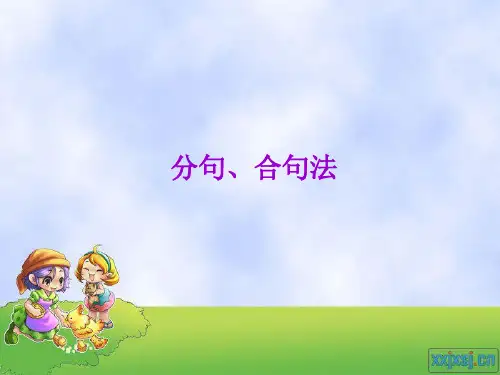
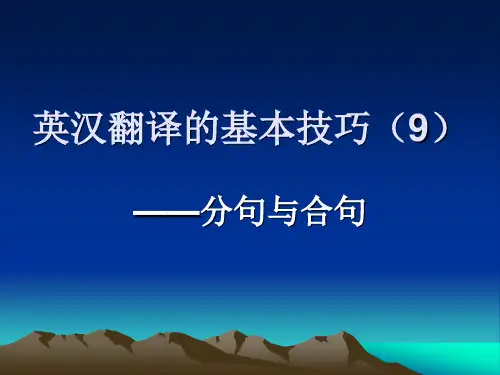
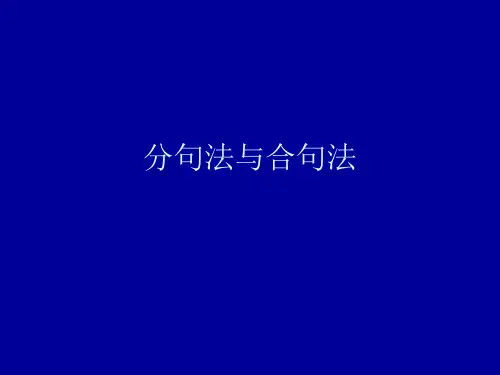
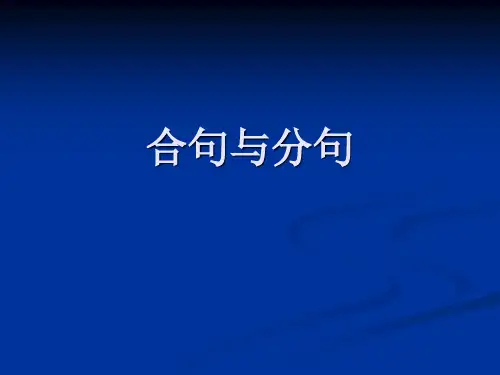

第四章分句、合句法教学目的:让学生了解如何运用分句、合句译法重点、难点:单词和复合句的分句、合句译法方法:讲解、提问、讨论教学步骤分句、合句法定义分句法---把原文的一个简单句译成两个或两个以上的句子。
合句法---把原文两个或两个以上的简单句或一个复合句在译文中用一个单句来表达。
分句法把原文中的一个单词译成句子,使原文的一个句子分译成两个或两个以上的句子。
副词The Chinese seemed justifiably proud of their economic achievements.译文:中国人似乎为他们在经济上取得的成就而自豪,这是合乎情理的。
Incidentally, I hope to get better medical treatment in these countries than I can Possibly get here in the United Stated.译文:我希望能在这些国家得到比我在美国这里所能得到的更好的治疗。
They, not surprisingly, did not respond at all.译文:他们根本没有答复,这是不足为奇的。
He wished he were at home. Ordinarily, he would have been there three hours ago.译文:他真愿那时候已在家里。
要是在往常的日子里,他早已到家三小时了。
Illogically, she had expected some kind of miracle solution.译文:她满想会有某种奇迹般的解决办法。
这是不合情理的事。
But, occasionally, through haste or carelessness, mistakes were made, so that at the end of the business day one teller would be short on cash, the other long.译文:但是,偶尔也有这种情况,由于仓促匆忙或者粗心大意而造成错误,结果当天停业结算时,有的出纳会短了现金而另一个却会多了现金。
形容词Chairman Mao might have spoken with understandable pride of his policy of “self-reliance”.译文:毛主席在谈到他的“自力更生”的政策时,也许有些自豪感,这是可以理解的。
That region was the most identifiable trouble spot.译文:那地区是个麻烦的地方,这是大家最容易看得出来的。
He had long been held in cordial contempt by his peers; now that contempt was no longer cordial.译文:长期以来,他的同僚虽然看不起他,却还是对他有些亲切感,现在,除看不起他之外,亲切感也没有了。
He stalked away, but with a gnawing uncertainty in his breast.译文:他昂首阔步地走开,心里半信半疑,感到十分苦恼。
名词A movie of me leaving that foxhole would look like a shell leaving a rifle.译文:我离开哪个担任掩体速度之快,要是拍成电影的话,会象出膛的子弹一样。
He shook his head and his eyes were wide, then narrowed in indignation.译文:他摇了摇头,两目睁得圆圆的,接着又眯成一条线,脸上露出了愤怒的神色。
As a place to live, it left much to be desired. As a secret training base for a revolutionary new plane, it was an excellent site, its remoteness effectively masking its activity…译文:作为居住的地方,这里有许多不足之处。
但作为完全新型飞机的秘密训练基地切实非常理想的。
它地处边陲,人们不易了解其中的活动……The inside of each tent depended on the personality of its occupants.译文:每个帐篷内怎样的布置,这要看各个使用者的性格了。
把原文中的一个短语译成句子,使原文的一个句子分译成两个或两个以上的句子。
分词短语They were at home in the home of the people, moving confidently without fear.译文:他们在群众佳丽感到自在,行动时心里踏实,无忧无虑。
She sat with her hands cupping her chin, staring at a corner of the little kitchen.译文:她坐在那儿双手拖着下巴,眼睛凝视着小厨房的一角。
Sunrays filtered in wherever they could, driving out darkness and choking the shadows.译文:阳光射入了它所能透过的所以地方,赶走了黑暗,驱散了幽影。
He was lying on his side watching her.译文:他侧身躺着。
双目凝视着她。
But they had become nomads of the desert, living on the ground and under the sky, and they loved it .译文:可是他们都变成沙漠里的牧民了,生活在苍天之下,黄土之上。
他们可也喜欢这种生活。
名词短语I wrote four books in the first three years, a record never touched before.译文:我头三年写了四本书,打破了以往的记录。
The military is forbidden to “kill” the vessel, a relatively easy task.译文:(政府)禁止军方“击毁”这艘潜艇,虽然要击毁该艇并不怎么费事。
The station chief would have to be close to the director, a member of the inner circle.译文:这位站长就得接近董事,因为董事是核心集团的成员。
Energy can neither be created nor destroyed, a universally accepted law.译文:能量既不能被创造也不能被消灭,这是一条普遍公认的规律。
The hospital was already spreading a fame for its food.译文:这个医院伙食好,这点已远近闻名了。
前置词短语1)In August 1946, on my fifth trip through China, bound for my Moscow home but not in haste, since my husband had died in the war, I came to Yanan.译文:1946年八月,我在回莫斯科家的途中,第五次路过中国;由于我丈夫已在战争中牺牲了,当时我并不急于回去,就到了延安。
2)Their power increased with their number.译文:他们人数增加了,力量也随之增强。
3)He arrived in Washington at a ripe moment internationally.译文:他来到华盛顿,就国际形式来说,时机正合适。
4) Doctors and men both talked about a miracle drug constantly almost with awe.译文:医生和伤病员常常叹气一种神奇的药物,而且谈时几乎都带着一种敬畏的口气。
5) The answer had been there all of the time just out of reach.译文:答案一直摆在那里,可(他)就是没有拿到手。
6) Mr. Myles still smiled but his voice had a little bit of irritation in it, unusual to Rob.译文:麦尔斯先生仍然面带微笑,可是他的口气却有点不耐烦了。
(三)把原文的一个句子拆开,译成两个或两个以上的句子。
1)Sometimes Mrs. Cross would be walking around in the big kitchen watching him eat.译文:有时,克罗斯太太一面在大厨房踱来踱去,一面看他吃饭。
2)She had made several attempts to help them find other rental quarters without success.译文:她已试了好几次,要帮他们另找一所出租的房子,结果并未成功。
3)But another round of war in the region clearly would put strains on international relations.译文:但是,如果该地区再次发生战争,显然会使国际关系处于紧张状态。
4)His failure to observe the safety regulations resulted in an accident to the machinery.译文:因为他没有遵守安全规则,机器出了故障。
5) The ample yard in back is dominated by heavily bearing fruit trees.译文:屋后是个宽敞的院子,大部分都给果实累累的果树占据了。
6) David opened the door, and Arthur went out into the rain.译文:大卫把门打开,亚瑟走出去,冒着雨。
7) He wanted to tell John how surprised he was at his knowledge but embarrassment made him hold his peace.译文:他想告诉约翰,他没有料到他的知识有这么渊博,但是觉得有些不好意思,没有说出口。